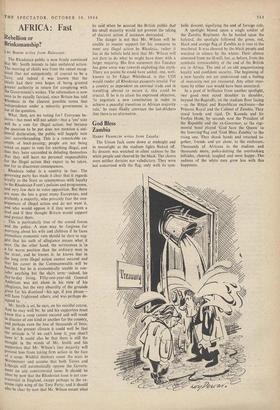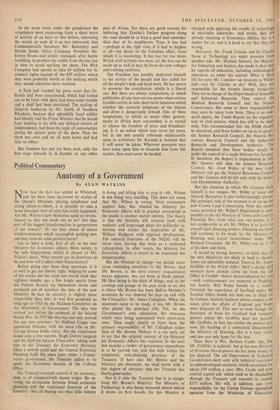God Bless Zambia
HARRY FRANKLIN writes from Lusaka: The Union Jack came down at midnight and in moonlight as the stadium lights flicked off. Its descent was watched in silent sadness by the white people and cheered by the black. The cheers were neither derisive nor valedictory. They we're not concerned with, the flag, only with its sym-
bolic descent, signifying the end of foreign rule.
A spotlight blazed upon a single soldier of the Zambia Regiment. As he hauled upon the halyard, the spotlight .followed the green, red, black and orange flag of Zambia as it rose to the masthead. It was cheered by the black people and watched in silence by the whites. Their silence stemmed from no but,- as before, from the symbolic irrevocability of the end of the British era in Africa. The end of an old unquestioning loyalty and confident security. The beginning of a new loyalty not yet understood and a feeling of insecurity not yet reassured. Any other reac- tions by either race would have been unnatural.
In a pool of brilliance from another spotlight, two good men stood shoulder to shoulder, beyond the .flagstaffs, on the stadium floor facing —in the Royal and Republican enclosure—the -Princess Royal and the Cabinet of Zambia. They stood lonely and rigid, Dr. Kaunda and Sir .Evelyn Hone, by seconds now the President of the Republic. and the ex-Governor, as the regi- mental band played `God Save the Queen' to the lowering''flag and `God Bless Zambia' to the rising one. They shook hands and returned to- gether, friends and yet alone, to the enclosure.- Thousands -of Africans in the stadium and• thousands more, polka-dotting the overlooking hillsides, cheered, laughed and were happy.--The sadness of the white men grew less with this• happiness.
In the press room under the grandstand the teleprinters were recovering from a short burst of activity of an hour or two before, informing the world, or such of it as was interested, that Commonwealth Secretary Mr. Bottomley and British South Africa Company President Mr. Emrys Evans had jointly managed, after hectic fumbling, to produce the rabbit from the hat just in time to avoid spoiling the show. The BSA Company had agreed to take £4 million for its mineral rights instead of the £35 million which they were probably worth or the nothing which they would otherwise have received.
A flash had reached the press room that Dr. Banda had been assassinated, which had turned out to be false—but there had been some trouble and a chief had been murdered. The sacking of General Anderson by Mr. Smith of Southern Rhodesia, because that splendidly loyal soldier had bluntly told the Prime Minister that he would have nothing to do with any disloyal seizure of independence, had been the topic of conversation during the quieter parts of the show. Now the show was over and we all went home and had time to reflect.
But freedom has not yet been won, only the first stage towards it, in Zambia or any other part of Africa. Yet there are good reasons for believing that Zambia's further progress' along the road should be at least a good deal smoother than that of its neighbours. True, it has had —perhaps at the right time, if it had to happen at all—the shock of the Lenshina affair, from which it is recovering. It has lost far too many British civil servants too soon, yet the loss can be made up as well as may be from the new colleges and training institutes.
The President has humbly dedicated himself to the service of the people and has called for all the people's help and hard work. He has sworn to preserve the constitution, which is a liberal one. But there are always temptations, to which politicians of any race are too prone when serious troubles arrive, to take short-term measures which smother the outward symptoms of the disease and drive it dangerously inward. One of these temptations, to which so many other govern- ments in Africa have succumbed, is to curtail or silence the freedom of press and broadcast- ing. It is an action which may serve for years, but in the end usually rebounds unpleasantly upon its activators. Dr. Kaunda is insistent that it will never be taken. Whatever pressures may later come upon him to dissuade him from this resolve, they must never be heeded.



































 Previous page
Previous page